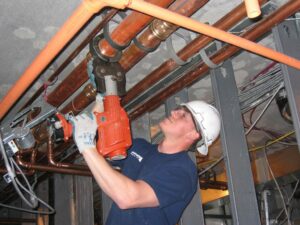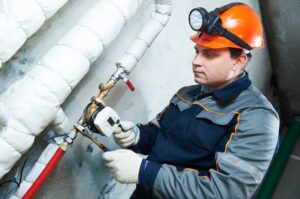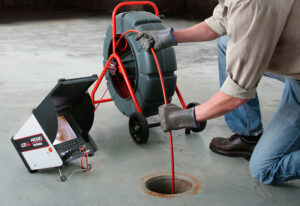Unsung heroes live in our metropolitan landscapes, where skyscrapers rise and businesses thrive. The commercial plumbers, not architects or engineers, keep these businesses running smoothly. Their skills bring the complicated maze beneath buildings to life, giving them life and function.

Commercial plumbers face ongoing challenge and complexity beneath elegant lobbies and gleaming corridors. These specialists manage systems that serve hundreds or thousands of people everyday, unlike domestic workers. In this field, a single mistake can interrupt a business’s operations or endanger its customers.
Imagine a multi-story hotel’s plumbing. The showers, sinks, and toilets in each room link to a large network that supplies fresh water and efficiently drains wastewater. But there’s more. Laundries, kitchens, pools, and maybe spas have different plumbing needs. Imagine composing this symphony of pipes, valves, and drains to ensure flow and junction harmony. Commercial plumbers face this regularly.
Commercial plumbing goes beyond skyscrapers and hotels. Think about sports venues where thousands may use the facilities at once or large shopping malls with food courts, fountains, and restrooms. These systems require skill, forethought, and innovation to develop, implement, and maintain. Each site faces distinct obstacles, from maintaining water pressure on upper floors to implementing intricate water recycling systems.
Commercial plumbers are water stewards in large establishments and sustainability advocates. Many modern structures seek green certifications, which require water, energy, and environmental conservation. Combining ancient plumbing wisdom with modern technology like rainwater harvesting, greywater recycling, and energy-efficient heating systems is a dance.
However, commercial plumbers do more than install and design. Their maintenance and troubleshooting skills are equal. Plumbing failures can be disastrous in a busy hospital or 24/7 manufacturing operation. The commercial plumber acts as a detective, identifying problems, predicting problems, and assuring system efficiency.
Commercial plumbers are adapting to a digital environment. Digital sensors, automation, and real-time monitoring are common in commercial plumbing systems. Systems that notify facility managers of leaks or reveal water use patterns are popular. In this changing world, commercial plumbers are both technicians and craftsmen.
Despite the noise of pipes, valves, and computerized instruments, commercial plumbers are distinguished by their dedication to safety and health. Plumbing, especially in commercial settings, goes beyond function. It is crucial to cleanliness, health, and safety. Their job requires following codes, remaining current, and ensuring every installation meets the greatest safety standards.
Realizing that our modern metropolitan lifestyles, with all its comforts and privileges, depend on these subterranean guardians is amazing. The next time you admire a city’s skyline, remember that commercial plumbers control its lifeblood. They keep life-sustaining water flowing, supporting companies, comforts, and dreams in concrete jungles.

The Careful Work of Commercial Plumbers
In the bustling city jungles, it’s easy to be captivated by our skyscrapers, marketplaces, and cultural sites. Under this sparkling façade is a reality rarely sung about but just as important. Commercial plumbers maintain the complex pipelines that make urban life viable, efficient, and hygienic.
Commercial plumbers labor discreetly but everywhere. Every time you switch on a hotel shower, use a stadium’s facilities, or wash your hands at a restaurant, you’re experiencing their precise labor. And the fact that you scarcely notice it shows their skill.
Isn’t plumbing just plumbing? Commercial plumbing differs from residential plumbing like a bustling city from a tranquil hamlet. The stakes are great, the problems vast, and the complexity multifaceted.
A high-rise office tower is full of staff and guests. This goes beyond checking a bathroom faucet. Bathrooms, pantries, water coolers, and heating systems must be designed and maintained to withstand large and simultaneous demand. It’s about managing wastewater efficiently and hygienically without disturbances or odors.
In hospitals, sanitation is life-or-death. Here, commercial plumbers collaborate with health professionals, architects, and administrators to build clean, infection-free plumbing systems that aid patient care and rehabilitation. The smallest mistake can have far-reaching consequences.
Commercial plumbing is beautiful because of its complexity and adaptability. Commercial plumbers are pioneering green solutions as sustainable living and eco-friendly development gain popularity. These specialists are creating a future where urban constructions coexist with nature through rainfall harvesting, water conservation, and water recycling.
The job continues after installation. Commercial plumbing upkeep is difficult. In large commercial spaces with complex plumbing networks, finding and fixing problems is like solving a puzzle. Leaks, blockages, and malfunctions in such circumstances can disrupt operations, cost a lot, and even be dangerous.
As smart technologies penetrate our lives, commercial plumbing is quietly reviving. Sensors that identify water flow irregularities, systems that automatically regulate water temperature based on weather, and digital interfaces that provide real-time water consumption data—the modern commercial plumber is as comfortable with a touchscreen as a wrench.

Despite its technology and complexity, commercial plumbing is human. It involves analyzing a facility’s needs and creating customized solutions. It’s about anticipating problems and designing forward. Most significantly, safety, hygiene, and excellence are emphasized.
Defining commercial plumbers as technicians or service providers is misleading. They are artists, problem-solvers, innovators, and guardians. We celebrate these maestros‘ unsung symphonies every time we turn on a mall tap, attend a convention center event, or work in urban workplaces. Here’s to the silent heroes that keep our cities alive.
The intricate network of pipes and valves under the walls and tiles is a monument to commercial plumbers’ design and execution. Their task goes beyond connecting A and B. Instead, they tell nuanced stories of efficiency, endurance, and functionality. The seamless commercial experience tells these stories, not words. Their chapters—drip-free water, consistent temperature, unclogged drains—are carefully crafted.
Every business faces distinct obstacles. Spas with elaborate water features and therapeutic baths require different plumbing than cafeterias. With saunas and many showers, gyms struggle to supply hot water efficiently. Breweries and manufacturers require sophisticated plumbing solutions for production lines. Commercial plumbers are problem-solvers who adapt to changing business needs.
However, commercial plumbers face changing obstacles as urban settings change. Urbanization typically requires upgrading historical buildings’ plumbing systems without affecting their architecture. Environmental restrictions encourage water conservation and trash reduction. This dynamic environment keeps commercial plumbers learning, adapting, and innovating. They dance with urban development’s changing rhythms with grace and skill.

